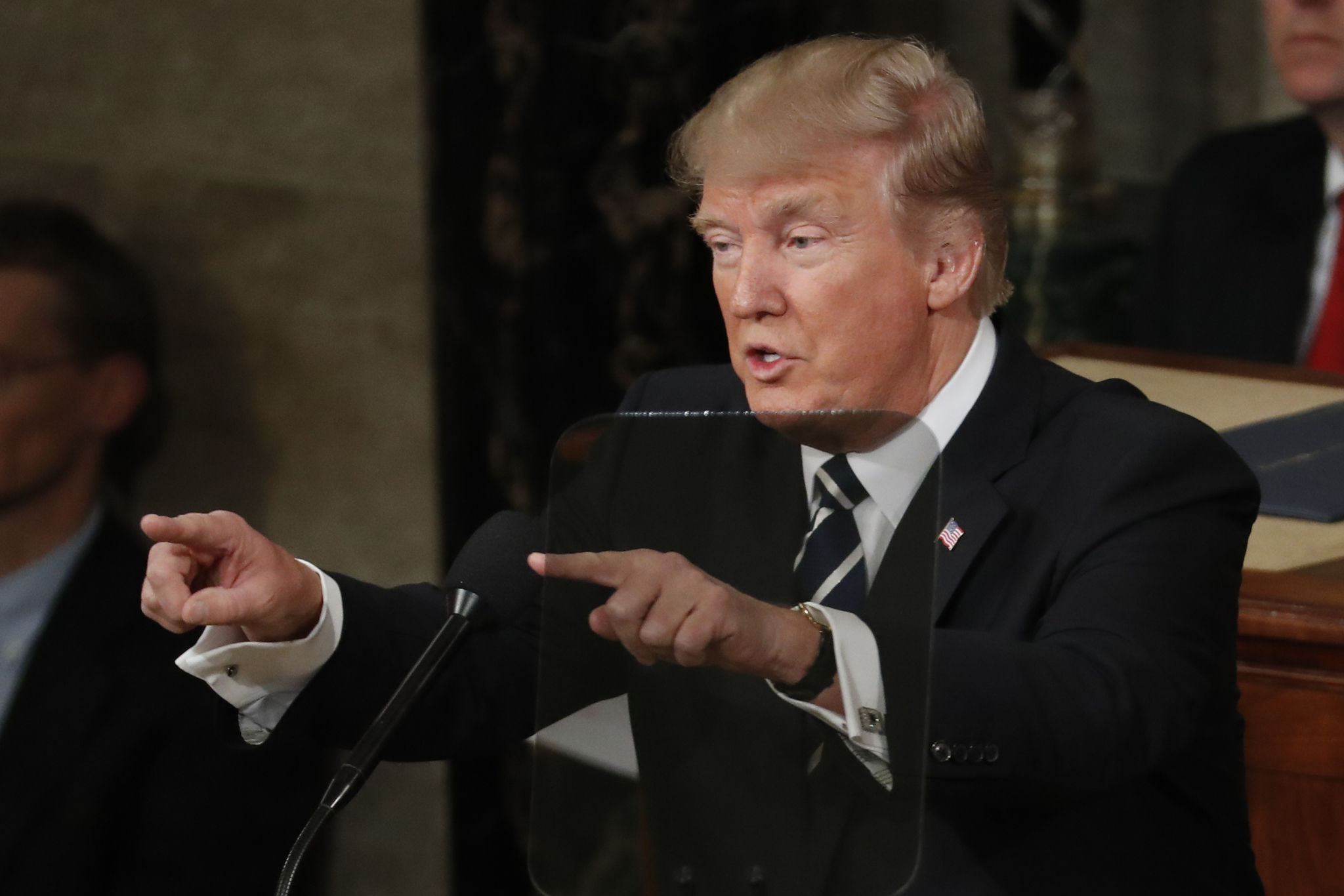WASHINGTON — Heralding a “new chapter of American greatness,” President Donald Trump issued a broad call for overhauling the nation’s health care system and significantly boosting military spending Tuesday night, swapping his trademark pugnaciousness and personal insults for a more restrained tone as he addressed Congress for the first time.
In an appeal to American optimism, Trump declared, “The time for small thinking is over.” Still, he employed dark language to describe the threat posed by “radical Islamic terrorism” — a term his own national security adviser rejects as inflammatory — and warned against “reckless” and “uncontrolled entry” of refugees and immigrants from countries with ties to extremist groups.
Trump’s overall message on immigration, one of his signature campaign issues, was unexpectedly mixed. He said he believed that “real and positive immigration reform is possible” and had suggested to news anchors earlier that he was open to legislation that could provide a pathway to legal status for some of the millions of people living in the U.S. illegally.
In his hour-long address, Trump defended his early actions in office and ignored the missteps that have set even his allies in Washington on edge. He outlined a populist agenda centered on promises to compel companies to bring manufacturing jobs back to the U.S. He was unusually measured and embraced the pomp and tradition of a presidential address to Congress.
The president was greeted by enthusiastic applause as he entered the House chamber, though it was filled with Democrats who vigorously oppose his policies and many Republicans who never expected him to be elected. Most Republican lawmakers have rallied around him since the election, hopeful that he will act on the domestic priorities they saw blocked during President Barack Obama’s eight years in office.
Topping that list is undoing Obama’s signature health care law and replacing the sweeping measure. Trump offered a basic blueprint of his priorities, including ensuring that those with pre-existing conditions have access to coverage, allowing people to buy insurance across state lines and offering tax credits and expanded health savings accounts to help Americans purchase coverage. He suggested he would get rid of the current law’s requirement that all Americans carry insurance coverage, saying that “mandating every American to buy government-approved health insurance was never the right solution for America.”
Making a direct appeal for bipartisanship, Trump turned to Democrats and said, “Why not join forces to finally get the job done and get it done right?”
Democrats, now firmly ensconced in the minority, sat silently while Republicans stood and cheered. Some wore blue, pro-health care buttons that read “Protect our care,” and dozens of Democratic women wore white in honor of the suffrage movement.
Delivering Democrats’ formal response after the speech, former Kentucky Gov. Steve Beshear accused Trump of planning to “rip affordable health insurance” from Americans and being “Wall Street’s champion.”
Trump was vague in his call for tax reform, another Republican priority. He promised “massive tax relief for the middle class” and a reduction in corporate tax rates, but glossed over how he would offset the cuts.
The president also urged Congress to pass a $1 trillion infrastructure package financed through both public and private capital.
“The time has come for a new program of national rebuilding,” he said.
First lady Melania Trump sat with special guests who were on hand to amplify the president’s agenda, including the family members of people killed by immigrants living in the U.S. illegally. The widow of former Supreme Court Justice Antonin Scalia also sat alongside Mrs. Trump, a reminder of the president’s well-received nomination of federal appeals court Judge Neil Gorsuch to fill Scalia’s seat.
The majority of Trump’s address centered on the domestic, economic-focused issues that were at the center of his presidential campaign. His national security message centered largely on a call for significantly boosting military spending and taking strong but unspecified measures to protect the nation from “radical Islamic terrorism.”
Underscoring the human cost of those efforts, Trump honored Chief Special Warrant Officer William “Ryan” Owens, who was killed in a raid in Yemen during his first days in office. Owens’ widow, Carryn, sat in the guest box with tears streaming down her face as the crowd stood and applauded at length.
Owens’ death, as well as the killing of several civilians, have raised questions about the effectiveness of the raid. Owens’ father, Bill, has refused to meet with Trump, has called for an investigation into the raid’s planning and has criticized the administration for its timing.
Pushing back against the criticism, the president said Defense Secretary Jim Mattis had assured him that the operation generated “large amounts of vital intelligence that will lead to many more victories in the future against our enemies.”
Trump also voiced support for NATO but reiterated his call for partner countries to meet their financial obligations to the military alliance. Trump has previously called NATO “obsolete,” setting some allies on edge about his commitment to the partnership.
The president opened his remarks by condemning the recent threats against Jewish community centers and a fatal shooting in Kansas being investigated as a hate crime.
The president had received criticism from some civil rights groups who had accused him of being slow in denouncing the violent acts.
AP writers Catherine Lucey and Vivian Salama contributed to this report.

